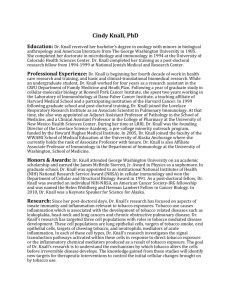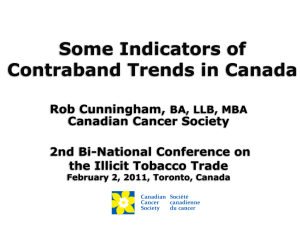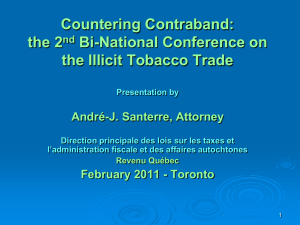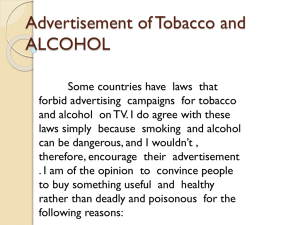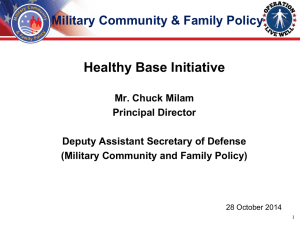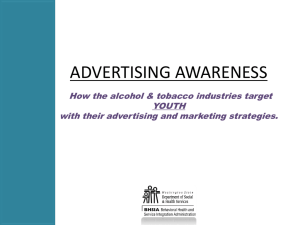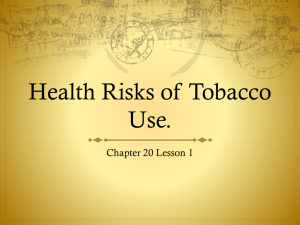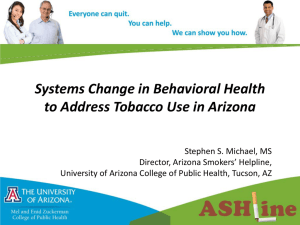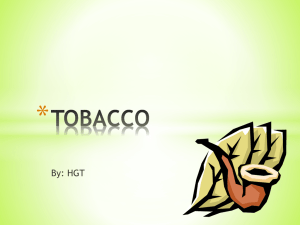Button Text - A PROMISE Partnership
advertisement
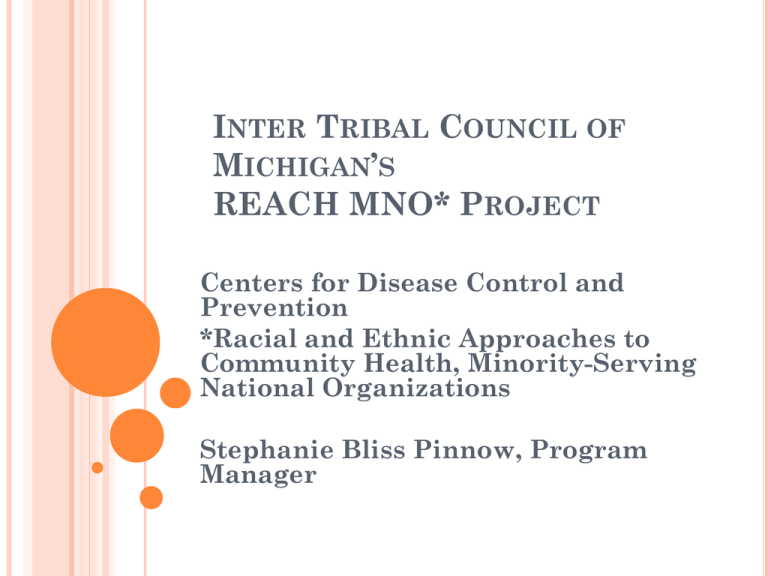
INTER TRIBAL COUNCIL OF MICHIGAN’S REACH MNO* PROJECT Centers for Disease Control and Prevention *Racial and Ethnic Approaches to Community Health, Minority-Serving National Organizations Stephanie Bliss Pinnow, Program Manager OVERALL PROGRAM GOAL To identify and disseminate evidencebased information and provide capacity building opportunities related to the integration of commercial tobacco abuse and prevention strategies into chronic disease programs NON-CEREMONIAL COMMERCIAL TOBACCO USE CAUSES THE FOLLOWING*: Heart Disease Cancer Chronic Obstructive Pulmonary Disease Stroke Asthma Maternal/Child Health Diabetes+ *According to CDC’s Community Guide on Tobacco Use http://www.thecommunityguide.org/tobacco/index.html +Evidence to suggest commercial tobacco use is associated with an increased risk of diabetes http://www.diabeticcareservices.com/diabetes-education/diabetes-andsmoking EVIDENCE-BASED, PROMISING PRACTICES, BEST-PRACTICES AND INDIAN COUNTRY Question: Why is important to define, understand, and identify these practices? Answer: With limited funding and high rates of chronic diseases, it is important to do the best we can to and learn from one another so that we can reclaim the health or our communities. With knowledge brings power DEFINITIONS* Evidence Based Practices -Programs formally evaluated to be effective, sometimes called Best Practices, that can be replicated and implemented, even with modifications in other settings Promising Practices - Programs not formally evaluated (or formal evaluation is not yet complete) but identified by experts as programs with results suggesting efficacy and worthy of further study in broader pilot implementation efforts. Local Efforts - Programs and/or activities that have not been evaluated but are identified by local programs as producing positive results. *http://www.ihs.gov/oscar/index.cfm?module=FAQ#q2 PRACTICE-BASED EVIDENCE* Practice-Based Evidence (PBE): A range of treatment approaches and supports that are derived from, and supportive of, the positive culture of the local society and traditions. Importance of PBE’s *Jamie Bartgis & Dolores Subia BigFoot, 2010. The State of Best Practices in Indian Country . Concept Paper, Healthy Indian Country Initiative Promising Prevention Practices Guide 2010. CURRENT ITCM REACH MNO PARTNERS INCLUDE: COLLABORATORS Inter Tribal of Arizona Native American Cancer Research Organization http://natamcancer.org/ National Native Network http://itcaonline.com/ http://www.keepitsacred.org/network/ University of Arizona-Basic Tobacco Intervention Skills for Native Communities http://bandura.sbs.arizona.edu/hcp/IHS/index.htm PROGRAM OBJECTIVES FOR 2012 Technical Assistance to partners Trainings-nationally, Tribal-specific Capacity-Building-nationally, Tribal-specific Promising Practices Document Monograph ACTIVITIES Monthly workgroup calls to partners-TA Identification of Promising Practices that integrate commercial tobacco control/prevention into chronic disease programs Capacity Building-trainings conducted for the University of Arizona’s Basic Intervention Tobacco Skills for Native American Health in South Dakota with community Health Representatives HIC Wellness Advisory Council HIC Focus Groups A PROMISE CONFERENCE A PROMISE National Conference “Reclaiming the Health of Our Tribal Nations” A PROMISE: American Indians/Alaska Natives Promising Practices to Reclaim Our health to Mobilize communities to Integrate tobacco and chronic disease prevention and advance policy, Systems, and Environmental change. http://apromiseconference.com/ A PROMISE CONFERENCE GOALS (4) Supporting healthy communities through tribal governance Integrating commercial tobacco and chronic disease programs Using evaluation to develop best practices Sharing tools, resources, and approaches A PROMISE PRE-CONFERENCE TRAININGS The Path to Health and Wellness: Building Our Strength in Program Planning and Evaluation Tobacco Dependence Treatment Continuing Education Programs Provided by Janis Weber, PhD from JCW Research & Evaluation Group, Inc. Provided by The University of Arizona HealthCare Partnership Building Your Program into a Practice of Promise Provided by Red Star Innovations For more information including summaries and learning objectives, please visit: http://apromiseconference.com/preconference-training.php THANK YOU FOR YOUR TIME PLEASE VISIT HTTP://APROMISECONFERENCE.COM/ FOR MORE INFORMATION REGARDING OUR UPCOMING CONFERENCE STEPHANIE BLISS PINNOW CONTACT INFO: SPINNOW@ITCMI.ORG 906.281.0333


